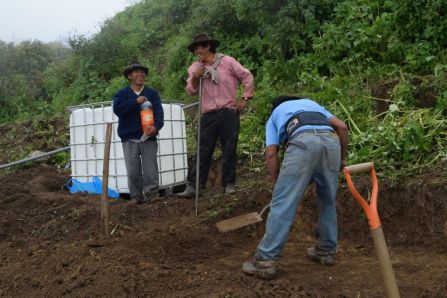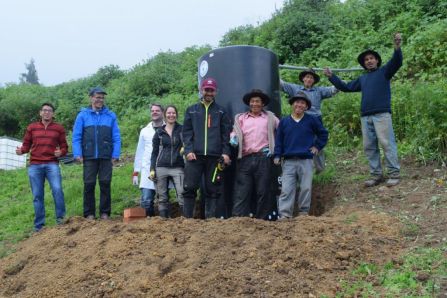Installation of pilot plants for drinking water treatment and wastewater treatment in the Peruvian highlands
| Date |
Date
|
As part of the GRoW project Trust, scientists from the University of Stuttgart are currently building several training and pilot plants for drinking water treatment and wastewater reuse for irrigation together with local partners and stakeholders in Peru. The municipality of San Andrés de Tupicocha, the local operator JASS, the DVGW Water Technology Center (TZW), the Universidad Nacional de Ingeniería Lima (UNI), as well as local NGOs are closely involved in installation of the pilots plants.
A significant part of the rural communities in the highlands of Peru still lack access to clean drinking water, while their wastewater is released into the environment without treatment, thus posing a potential risk to people and the environment. Reasons are manifold – a lack of technical infrastructure, a lack of knowledge about the operation of the plants, a lack of financial opportunities, and insufficient planning capacity. At the same time, the residents are aware of the problems and there is great interest in solving the problem.
“We are building the plants together with the community. All parts of the plant were purchased at relatively low costs in local hardware stores in Peru. This ensures that from the first day the operator knows exactly how the systems work, how they can be repaired, and that spare parts are always available at low cost”, explains Manuel Krauß from the Institute for Sanitary Engineering, Water Quality and Waste Management (ISWA).

Involvement of the local population is guaranteed through workshops and accompanied by interviews organized by the Center for Interdisciplinary Risk and Innovation Research (ZIRIUS) and carried out together with local NGOs. “We are planning regular activities in order to raise awareness among the population and to strengthen the local operator community. This is the only way to ensure that long-term operation is technically and organizationally feasible”, says Christian D. León (ZIRIUS), coordinator of the project.
The experience of operating the pilot plants will help to design large-scale drinking water treatment and wastewater treatment for San Andrés de Tupicocha. The training facility concept is transferable to other highland communities and will be presented to the public in Lima in September.
The University of Stuttgart, in collaboration with the TZW, San Andrés de Tupicocha, the Universidad Nacional de Ingeniería and local NGOs, is thus contributing to achieve SDG 6 – Clean Water and Sanitation in the Peruvian Highlands by 2030.
Due to the current COVID-19 pandemic and the associated curfew in Peru, the works are currently interrupted.
Please find more photos of the works as carried out up until now, as well as a Spanish version of the project’s activities on the Trust project homepage: here.

